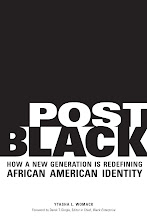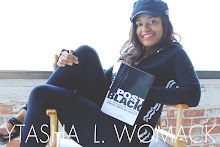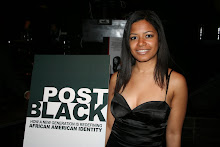Joan Morgan is one of hip hop journalism's prized pioneers and celebrated culture critics. Her work explores culture and sexism. She wrote the black feminist reader "When Chickenheads Come Home to Roost." Her latest essay “Black Like Barack” is featured in the book “The Speech: Race and Barack Obama's “A More Perfect Union.” A woman of Jamaican heritage, she was raised in New York.
YLW: Your book "When Chickenheads Come Home to Roost" continues to be a popular feminist reader. Are you surprised that nearly a decade after the release it's still relevant?
JM: I would hope that it wouldn't be as relevant and that we would have moved away from some of the issues that the book grappled with. It's probably more relevant on a mass scale then it was when it was initially published. I'm still surprised when I get a 22-year old who says I love your book. In some ways it has actually gotten worse.
YLW: What's gotten worse? Are you referring to hip hop?
JM: When I wrote "Chickenheads" there was a much greater range of women in the music and a greater presence of the female voice. You don't have that now. That lack of representation is a problem. There has been a narrowing of the type of hip hop and no real improvement in the level of sexism and misogyny in the music. If you were conflicted before you are more discouraged now. I talk to women now who don't even feel they have a place in the culture. At the time, I felt that it was as much mine as anyone else's.
YLW: You are a pioneer in hip hop journalism. What are your thoughts on the evolution of the field?
JM: When I started writing there was no hip hop journalism. I remember when someone came up to me and Kevin Powell and said I want to be like you, I want to be a hip hop journalist. We were writers. We weren't aspiring to be hip hop journalist. I think the evolution is a good thing but no one was trying to establish that as a genre. We were pioneers. We grew into the title and learned how to work with it. I think there's a great body of work from 79' to the late 90s of important works by a group of important writers who documented the culture. That said, I don't see a lot of hip hop journalism these days. It's much more about celebrity culture.
YLW: How do you define hip hop journalism?
JM: Hip hop journalism is committed to writing about hip hop culture but unafraid to criticize the culture, the artist, and to defend it. Hip hop was not glamorous when I started. There was no glory. If you wrote about hip hop, you were in a grimy club at 1 am in the morning. There was no car service. But when it became this multi-million dollar machine all that changed.
Writers weren't afraid to do criticism. Now music writing is a part of celebrity culture. Everyone wants to be down. They don't want to harm a relationship with the artist, label, advertisers. It limits the form of writing. In the past, writers were committed to being honest and to being critical.
I think hip hop journalism was really born in a certain time period and out of a real desire to fight for a place and a context for the music. And it was written by people who were from that culture. So when those stories were calculated and were told, it was written by people who were a part of the culture.
YLW: Are you happy with hip hop's growth into this multi-million dollar enterprise?
JM: Yes and no. I'm a late 70s baby. I'm a child of hip hop. I never had the expectation that it would live forever. I still remember being completely shocked when I heard a rap song on the radio. I saw it make the journey from the hood to where it is now. I never operated with the 'oh this could last forever' mentality. In many ways we were just kids who didn't realize the enormous potential it had to capture the world's imagination. In that respect it has far exceeded my expectations.
On the other level, I'm disappointed in the level of creativity. I just don't like it. To be fair, I think the production is better. You could argue that linguistically the skill level has far surpassed “ a hip hop a hippee, etc” and you have an artist like Jay-Z who keeps evolving. But I just don't think the music is that good.
YLW: What are your thoughts on writing these days? Do you follow any emerging music writers?
JM: I remember Kevin Powell's answer to that kid who asked how do you become a hip hop journalist and he said read . . . read Toni Morrison. James Baldwin. That' s one of the disadvantages of the blogosphere and print media. Anyone and their mother can call themselves a writer now because they have a blog. Every single piece we wrote back then was like going to school because your editors were kicking your ass. I read stories today and it feels like I'm reading a bio. The publicist could have written it. It's the machine behind it. Before as a hip hop journalist I could say I have to be alone with this person for 3 days. You can't do that anymore.
YLW: How do women reconcile with some of the sexism in popular culture?
JM: I think women are equally conflicted with it. We still live in a society where you can have instant celebrity by sleeping with Tiger Woods and selling your story to the media. You can be a video vixen and your story can get a million dollar book advance, where a hip hop journalist isn't going to see that kind of money.
YLW: You don't use the term African American. You prefer black. Why?
JM: I look in the mirror and see that I'm a black woman and see our commonalities but I do have a cultural experience that is different from all of my friends who are African American. I don't allow people to introduce me as an African American writer because people make assumptions. They make assumptions about my culture that aren't bad, they're just false. I'm from a group of very proud Jamaicans and that should be honored.
When I think post black, I hope there's an understanding that everyone who is black in America doesn't share the same background and experience. Our diversity should be embraced. When people use African American they mean the specific experience of being black and being a descendant of southern slaves, which is a really important part of the black experience in America, but it's not the only narrative.
YLW: Don't people take issue with you not calling yourself African American?
JM: All the time. I just applied to grad school to do my dissertation on it. I used to not care. I didn't think it was a big enough deal. Then I did my first book signing and my entire Jamaican family was in Barnes and Noble. My husband at the time, his family is from Jamaica and Tobago, so our child is completely of Caribbean and American decent. and from that he's a descendant of Jamaican and Chinese ancestry. At the reading, I was introduced as an African American writer and to my family that was a complete erasure of them.
YLW: In POST BLACK, I tell a story about trying to explain the nuances between using the term African American and black to an English journalist. He was completely confused.
JM: Black is a diverse experience. Even if you say African American means I have roots in Africa, well, by that definition Charlise Theron is African American. I say I'm black and bi cultural. When I'm in Jamaica, I'm considered to be Jamaican. Unless I speak in patois most don't know I'm from Jamaica. You have to have a definition of black that's more expansive.
We need commonalities that are greater than racism. I don't define myself by what a racist white person sees. So if the definition of African American comes in that I have to erase everything that I was before I came to this country, in the case of most immigrants they just won't embrace that. They just won't sign on. They don't see themselves as African American because we don't focus on our commonalities as black people. But it's not just typical of African Americans, it's an American thing. I've never been to Africa. Hope to go. But you're asking me to skip the whole country that I came from, when Africa embodies all these ethnic experiences, too. We have a lot of work to do. We have to create a narrative that is a little more flexible.
I think there's a responsibility on the part of immigrants as well. If you're moving to America you should learn about the culture here. I majored in African American studies because that was information I wasn't going to know if I wasn't in a classroom. I needed to know the culture of the people I was living with. I also take umbrage with immigrants who feel they don't need to know it. But for real diversity and tolerance you have to embrace one another. My child has a Chinese grandmother who speaks fluent patois. I can't get people to get pass the fact that Jamaica is a multi-ethnic country, too.
YLW: You wrote an essay “Black Like Barack” which ran in the book "The Speech: Race and Barack Obama's "A More Perfect Union." The essay explored attitudes by those who questioned the President's blackness during the campaign. You essentially said that if Barack's not black, neither are you. I've had the 'you're not really black' conversation recently. It's a strange discussion.
JM: I always love the 'you're not really black' conversation. Who holds the definitive definition on that?
Subscribe to:
Post Comments (Atom)




Really interesting stuff. I really like Morgan's explanation of African-American as being a term of origin rather than just ethnicity. My wife hates the term, but I never give it much thought. Since my parents are both Caribbean (Jamaican and Grenadian) it makes me wonder if I should take exception to it as well.
ReplyDeleteAs a Hip Hop journalist who also happens to be a woman, I must say I thoroughly enjoyed this interview. I have always tried to seek out women within the Hip Hop journalism world which has proven to be extremely difficult. But reading this and Joan's words almost brought me to tears because it was extremely inspiring. When you decide to become a Hip Hop journalist, no one gives you a guide and tells you how to handle certain situations, what to expect, or what to do. So a lot of upcoming writers become lost and succumb to the greater machine that surrounds them. Fortunately for me, I've remained on what I would like to think is the right side however, I still struggle everyday trying to document a culture that I grew up loving and respecting in an objective manner. It is not easy and there are many days where I want to give up but women like Joan Morgan give me hope and inspiration to keep going and to never give up.
ReplyDeleteI can't thank you enough for this interview. It truly touched me and hit home. Thanks again!
Arasia Magnetic